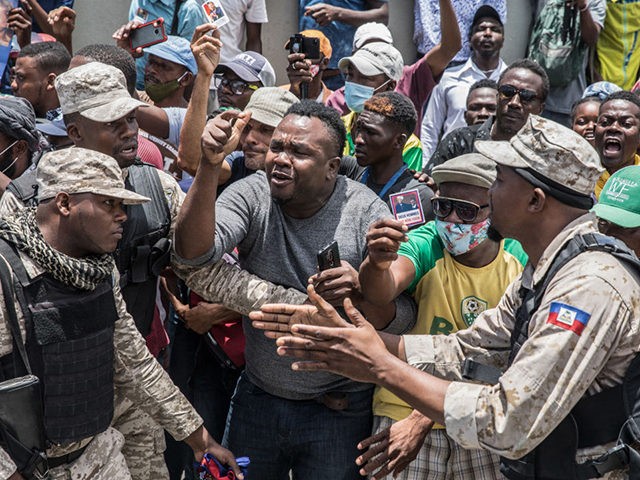The human rights advocacy group Cuban Prisoners Defenders revealed Wednesday that it had received evidence the Castro regime is putting protesters on trial in groups as large as 30 people at once without allowing them access to a lawyer or proper legal safeguards.
Thousands of people across the island of Cuba took to the streets on July 11 demanding an end to communism, a nationwide outcry that followed years of active, consistent organization by the island’s largest dissident groups. Protests continued throughout last week; organizers announced a nationwide march by the mothers of those arrested on July 11 to begin on Wednesday morning.
Cuban State Security agents began intensive campaigns last week to arrest and disappear protesters. In some cases, eyewitnesses and video footage proved that uniformed police officers were resorting to door-to-door raids, beating suspected protesters and opening fire on them despite no evidence that they presented any threat. Early estimates suggested police arrested or otherwise disappeared 5,000 people, though international human rights groups have been able to confirm only about 600 such arrests.
Those known to be in police custody have begun the process of being charged with “crimes” for actions like marching along with protests in silence or recording footage of police brutality. According to Cuban Prisoners Defenders, the Communist Party is denying most protesters the right to an attorney and police — not prosecutors — are in charge of the process. Without prosecutors, no formal indictment process exists.
“The summary ‘trials,’ with no lawyers or possible defense, are happening simultaneously in numbers of ten accused at a time, and we have even had knowledge of cases of 30 accused [processed] simultaneously,” the organization denounced. “We are talking about hundreds of people being processed, if not thousands. Extremely grave.”
Cuban Prisoners Defenders has previously condemned the Cuban regime repeatedly for refusing the right to an attorney to political prisoners. It noted in a report this weekend, based on preliminary discussions with sources on the ground there, that the accused often have no way of knowing what crime they are facing trial for until minutes before their sentencing.
“From the time that police initiate an ‘investigation’ to the trial, the majority of cases last between 48 and 96 hours,” the organization reported.
Cuba Decide, a pro-democracy advocacy group working in the country, has identified 642 individuals who have been either arrested or remain missing since participating in the July 11 protests. Of these, 526 people remain in custody or disappeared, while the remaining have been released. Some of the released remain either on house arrest or under strict government surveillance.
Advocacy groups have identified at least ten children among the arrested and disappeared. Most of the families of those identified, all of them in their teens, do not know the whereabouts of their children or accusations against them, Cuban independent outlets have reported.
Reports indicate that the Castro regime is also disproportionately targeting religious leaders. Among the arrested are the leaders of the Free Yorubas Association of Cuba, a group that practices the Afro-Cuban religion of Lucumí, or Santería, outside of the auspices of the atheist Communist Party.
“On July 19, 2021, the District Attorney of Placetas, Villa Clara, charged three members of the Association of Free Yorubas of Cuba, along with nine other individuals, with public disorder, disobedience, spreading the epidemic, and incitement,” the Global Liberty Alliance, which advocates for the safety and freedom of those under religious persecution, denounced Tuesday. “The Free Yorubas charged, Loreto Hernandez Garcia, Donaida Perez Paseiro and Elizabeth Cintra Garcia, will be held in a provisional prison as a precautionary measure until a trial is held.”
“These provisional prisons allegedly conduct re-education programs for political prisoners,” the group added.
Hernández García’s brother, Jorge Luis García Pérez “Antúnez,” told the Miami Herald that several of those arrested are parents to minor children who police left abandoned at home after abducting their parents. Antúnez himself served a 17-year term in prison in Cuba from 1990 to 2007 over his anti-communist activism; he now resides in Miami.
“They told my nephew that his parents were under arrest and awaiting trial,” Antúnez noted, adding that State Security officers are striving to break into homes and arrest people in the loudest, most terrifying way possible to scare neighbors out of considering participating in protests.
Catholic leaders have also suffered persecution. The most high-profile case during the current wave of protests has been that of Father Castor José Álvarez Devesa, arrested on July 11 after receiving a beating that left him with a bloody head injury. Police released Álvarez the next day after an unlawful detention. The clergyman explained in a subsequent interview that he was arrested after asking police for help to reach the hospital, once he realized police had beaten him to the point where he was bleeding profusely from the head.
“I went to help him [the injured protester], to take him out of that atmosphere … they beat me on the head. I would have been able to keep helping, but once I saw myself bleeding so much I knew I needed to go to the hospital,” he narrated. “I got to the I got close to the police, the only ones with a car, and asked them to take me. … Once they healed me, they detained me and I was taken to a police station.”

COMMENTS
Please let us know if you're having issues with commenting.